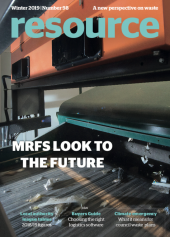An eye on the markets: New world order of quality
The market for recovered fibre has undergone much change in recent years. Prices have been falling steadily over the last 18 months, with a slight blip at the end of 2018. The number one reason is that our alphabet now starts with Q: the Q of quality!

Quality is a must and should be paid attention to, but this should be news to no one. In 2013 China already gave a warning with Operation Green Fence that the condition of recycling from countries such as the UK was not always good enough, but not everyone listened.
Following that, in 2017 the Chinese Government’s Administration of Customs announced its National Sword campaign to cut the illegal smuggling of foreign waste, which was a tougher regime. Again a lot of people didn’t take this seriously, so they imposed bans on mixed papers and tighter quality specifications. China didn’t want to be seen as the landfill of the world.
When this happened, a lot of the recovered fibre went to other countries until they also opened their eyes and realised that it wasn't what it said on the tin – EN643 or thereabouts. So, Indonesia, Malaysia, Vietnam and Thailand have been clamping down, and India is likely to follow in the near future.
These countries produce a lot of material for the European market, which has very clear guidance around Forest Stewardship Council (FSC) standards. If their European customers – companies such as Unilever – find out that material has not been produced to requirements, because, for example, it has been in contact with clinical waste through a co-mingled collection, then it can be a serious problem. So Asian markets are cutting out the grey areas. An illustration of this is that Indonesia is now considering introducing an export licence requirement, in the same vein as China has already done, to manage the recovered fibre arriving on its shores.

At the moment, recovered fibre will continue to trade as long as it meets the specification. If companies do not have good quality regimes then they will struggle to sell because the Environment Agency is also clamping down. There are already a lot of investigations ongoing: it's a sign that people need to start producing quality.
 This article was taken from Issue 98
This article was taken from Issue 98Looking ahead, prices will continue to experience downward pressure at the end of this year and early next year as mills have downtime over Christmas and New Year. I know some suppliers are offering material in Southeast Asia for extremely low prices and the price of OCC (cardboard) still has some room to drop.
It’s important to note that there is no obligation to recycle in the US. If the price goes lower, then they have no issues landfilling the material and in some cases they get rebates for this as it can generate good landfill gas. I know that several large MRFs on the West Coast have already been mothballed. So if the price for recovered fibre keeps dropping the US will just stop recycling and this will reduce the downward pressure on the global market.
Looking at the second half of next year, there’s some light at the end of the tunnel with new capacity coming on stream in Eastern Europe and Southeast Asia. However, there will only be a market for quality – inferior material not matching the specification cannot be processed anywhere. It means gate fees at MRFs are likely to rise as material will have to be double or triple sorted, reducing the recycling rate. I know some waste management companies are retrofitting MRFs, to create dedicated lines to optimise quality. They are also going to invest in public communications to make households stop bad habits such as mixing food waste in with their dry recycling.
In the end something has to give. It’s either the government, the collectors or waste management companies, but they have to do something. We need to clean the material up. The industry needs to get its collective heads together because we are heralding a new world order: quality. 
Herman van der Meij, Managing Director RCP Export (Global) for DS Smith, gives an update on the market for recovered fibre market for PRNs






